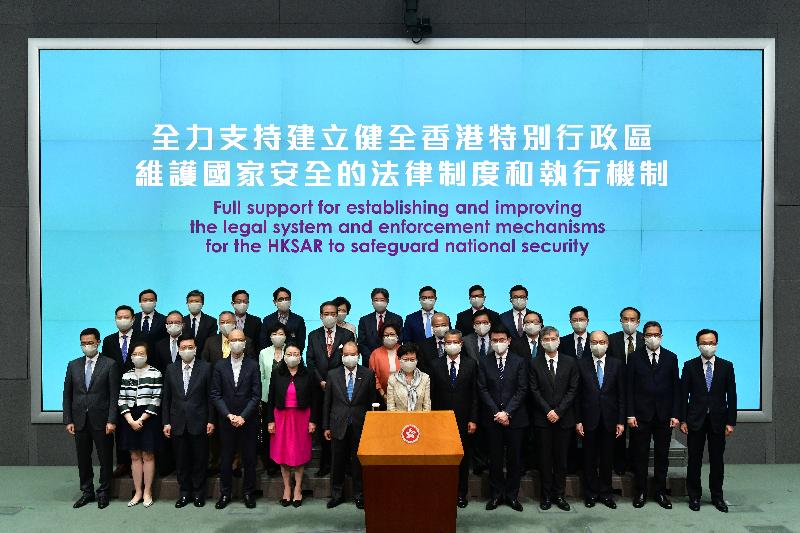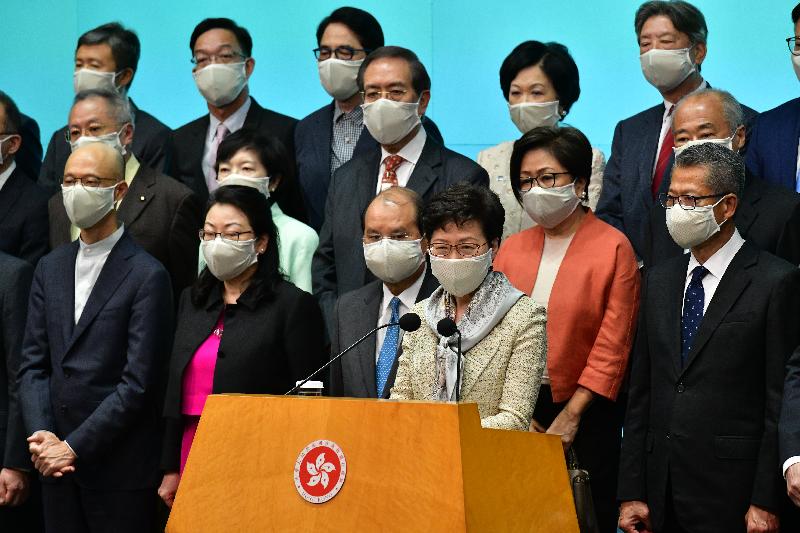The Chief Executive, Mrs Carrie Lam, together with Principal Officials and Members of the Executive Council, met the media today (May 22). Following is the transcript of remarks of the media session.
Reporter: Hi Mrs Lam. First of all your statement, your reassurances as well as members of the pro-establishment camp. They came throughout today, and they actually came before the market closed. We didn’t see any recovery in stock markets, because of the national security proposal, and also we saw that AmCham (the American Chamber of Commerce) issued a statement voicing concerns that, for business prospects, concerns for expats here, concerns for the business environment and freedoms here in Hong Kong. So how are you going to reassure the international business community, investors and members of the public that the city remains an international city with all its freedoms, online freedom, freedom of speech and autonomy intact?
My second question is that, you’ve been saying, you’ve been trying to create the right atmosphere to enact Article 23 national security legislation. Have you been pushing for that? Did you tell Beijing that you can do it? Or did you just give up? My third question is that you’ve been stressing that the national security legislation introduced today, by Beijing today, is meant to help safeguard people’s interests as well, so people can feel safe. Do you actually expect the protest violence will end because of the introduction of this legislation? What about the resistance? What about concerns by, do you expect the protests to just gonna stop? Are you going to ignore voices who are concerned about this legislation? Thank you.
Chief Executive: As far as the financial markets’ reaction to this sort of incidents, I think we need not be over-worried because the stock market goes up and comes down. What is important is the robustness of Hong Kong’s regulatory system and I’ve been assured by the Financial Secretary and we have also the Chairwoman of the Hong Kong exchange here that the system is robust as ever, so we need not be unduly concerned. As far as the chambers’ reaction, you have quoted the public response by one of the chambers but I have also read press statements issued by some of the Hong Kong local chambers who felt very much like what I have said, that especially having gone through almost one year of disruptions, violence and uncertainties, anything particularly in safeguarding national security that will help stabilise the environment is indeed very good for local investment sentiment. So, as usual, there are different views and different responses. At the end of the day we have to ask ourselves, for a place like Hong Kong, which is an inalienable part of the People’s Republic of China, could we do without that sort of system to enhance our ability to protect national security? I think the answer must be no. And since we could not do it on our own after 23 years, then this is a time for decisive actions to be taken by the Central Authorities.
Then I come to the second part of your question. I’m about to finish my third year in office as the Chief Executive. I did say at the very beginning that enacting local legislation for national security under Basic Law Article 23 is a constitutional duty of the Hong Kong SAR Government and myself as the Chief Executive. I have made attempts, some serious attempts, to try to create a better environment, which means that the Government needs to work with parties across the political spectrum in order to create that sort of more conducive environment for doing something which has proven to be very controversial about 16, 17 years ago. But unfortunately, despite a pretty peaceful start for a while, the relationship turned very difficult once we touched on sensitive issues that have a Mainland angle, and you know what I mean. I have been trying my best but since we could not do it, I don’t think we could do it in the foreseeable future, both in the Executive as well as the Legislature. I don’t know whether your term “giving up” is a right term. I’m not giving up but now there is another way of ensuring that Hong Kong will have the necessary legislation and the safeguards in place for national security.
For the third question, Hong Kong is a free society. Hong Kong will remain to be a very free society, where freedom of expression, freedom of protest, freedom of journalism will stay because these are the core values of Hong Kong and are very much protected by the Basic Law. I do not expect that protests will end. There will be protests of all sorts in Hong Kong as we have seen, but the important thing is for the people of Hong Kong to realise that without protection of national security, many of the things that we enjoy, many of the things that we treasure, will be lost. This is really the time for us not to waste any more time and to get on with these important legislative safeguards. Thank you.
Reporter: Excuse me Mrs Lam. Can you address the concerns by AmCham? Are you just gonna adhere to other chambers of commerce, other businesses who support the legislation and push aside the concerns of……
Chief Executive: No, everybody can come to us with their concerns and we will try to address their concerns. But as I have explained in response to another question, we are at the very, very early stage of this process. There is now a draft resolution in front of the National People’s Congress, which is part of the first step, and then we’ll move on to the second step, which is the drafting of the necessary legislation, and it was made very clear that in the course of the National People’s Congress Standing Committee in drafting the legislation, they will take into account the exact situation in Hong Kong, and that is the occasion for us to put forward any concerns that require the Central Authorities to respond. But of course if there are other concerns that we can immediately respond to, we are very happy to do that.
(Please also refer to the Chinese portion of the transcript.)
Follow this news feed: East Asia







